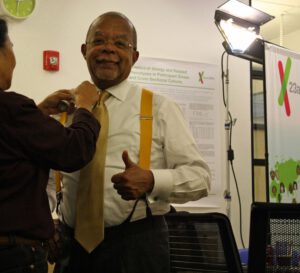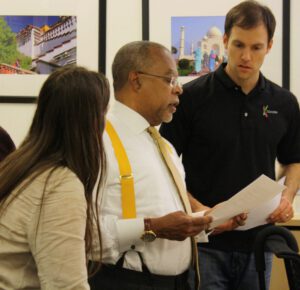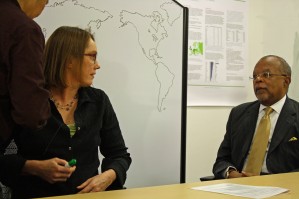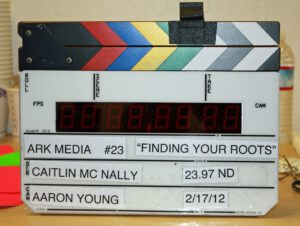As a PBS cameraman recorded the scene, 23andMe scientist Mike Macpherson drew lines connecting photographs of about two dozen celebrities to one another while Henry Louis Gates Jr. riffed on what those links all mean.

The connections were sometimes direct family relations, but more often than not, each celebrity was connected through one, two, or three others—cousins related to each notable person through common ancestors.
Each celebrity will be a guest in the upcoming 10-week PBS series Finding Your Roots, in which Gates delves into the family histories of his guests, tracing their stories back in time. When the paper records run out, he turns to DNA tests.
After Macpherson sketched a seemingly unlikely link between one of the guests with European Jewish ancestry and another, a Muslim of Pakistani descent, Gates remarked:
“It reaffirms that we truly are all the sons of Abraham.”
“Indeed,” Macpherson said.
 Mike Macpherson and Henry Louis Gates Jr. with producer Hazel Gurland.
Mike Macpherson and Henry Louis Gates Jr. with producer Hazel Gurland.
The exchange happened recently at our headquarters in Mountain View, where the Harvard scholar and cultural critic came with a film crew to record some final scenes for his upcoming PBS series, which starts March 25th and runs until the end of May. Gates also interviewed 23andMe’s Senior Director of Research Joanna Mountain.
Both Mountain and Macpherson were consultants for the series and helped research the genetic genealogy of Gates’ guests on the show. Although they were being interviewed on camera to explain some of the complex science, Gates often boiled things down into easy-to-understand concepts. Or as Macpherson said during one break, “He could do this all a cappella.”
Gates wasn’t alone. Producers Hazel Gurland and Caitlin McNally helped direct the shoot and frame some questions while a cameraman filmed the discussion. But it was clear that Gates was in charge, and he has a knack for finding the nugget that will captivate people, such as the idea that we are all interconnected genetically.
It’s not “six degrees of separation” that links any two people, but two or three degrees. And these are not social connections – a friend of a friend of a friend – but links through our DNA.
“Now that’s cool,” Gates said.
 Joanna Mountain and Henry Louis Gates Jr.
Joanna Mountain and Henry Louis Gates Jr.
If there’s a theme that links Gates’ body of work—or at least his oeuvre on PBS—which includes Finding Your Roots, African American Lives, Black in Latin America, and Faces of America—it’s this notion that the distinct lines we’ve drawn to distinguish ourselves from others are much fuzzier than they seem.
As Mountain said, the closer two peoples were geographically, the more they share genetically. Or, as Gates mischievously likes to say:
“What it proves is that – no matter what the laws were in that day and time, no matter how societies tried to force sexual segregation – when the lights came down, everybody was sleeping with everybody else.”

For Gates, a cultural historian, the author of 14 books, and the director of Harvard’s W.E.B. Du Bois Institute for African and African American Research, the point is that racial and ethnic dividing lines are not as sharp as many assume. This is particularly true in the United States.
“It’s a tribute to the true triumph of American democracy,” Gates said at one point during the shoot with Macpherson and Mountain. “It’s about the diversity of our people, which we can measure through genealogy and genetics.”



